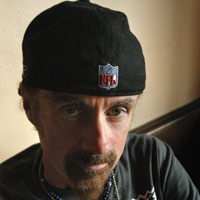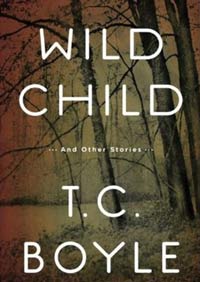T.C. Boyle’s New Book, Wild Child
Prolific Author Does It Again
T.C. Boyle is churning out books these days faster than most people can read them. With his monstrously dense take on the life and loves of Franklin Lloyd Wright, The Women, only recently released in paperback, and a March release date set for When the Killing Is Done—his fictional modern-day romp around the often bloody path to restoring native habitats and species on the Channel Islands—the über-prolific Boyle somehow found the time to put together the eighth short-story collection of his career. Wild Child and Other Stories is hitting the streets on January 21, and the author comes to Victoria Hall Theater to talk about it on January 25.

Speaking to me by phone this week from a snowy mountaintop hideout in the Sequoias, Santa Barbara’s most Converse-devoted author, less than a day removed from finishing up yet another short story, summed up his impressively vast and fast-growing bibliography with a no-nonsense laugh. “It’s my job,” he said. “I write seven days a week, just about 365 days a year … and I love it.”
Make no mistake; from his trademark red Chuck Taylors, backward ball cap covering his freethinking hair, and an assortment of finger and ear jewelry to his hyper-creative prose and often brilliantly unchecked imagination, Boyle is one of the proudest peacocks roaming the American literature landscape. At his best, he is a fearless wordsmith, sucking from the tit of his everyday life to find the inspiration and often the foundation for his next literary adventure. Once he has the seed for a story—be it the Frank Lloyd Wright-designed home he lives in, the daily view of the Channel Islands he enjoys, or a newspaper story about a feral kid found running free and naked in the woods of France—Boyle runs it through the great mutator of his mind and blows it up to larger-than-life proportions. The result is often a well-balanced blend of outrageousness, humor, history, and human nature that comes in every literary medium imaginable, except maybe poetry. As Boyle put it, “I’m free. I don’t have anyone telling me what to do. Anything you tell me or I read in the newspaper can become a story the next day. … I’m not limited in the ways that so many writers are. I will write in any way.”

It is this freedom that is Boyle’s greatest strength as well as his weakness. While novels like The Women, Talk Talk, and The Inner Circle have moments of undeniable excellence, they are also dense with show-off creativity, literary tricks, and inside jokes, all of which exhaust and alienate the average reader. They read as if Boyle is having too much fun letting loose and his editors not enough fun reining him in. In the short-story medium, however, this sort of unbridled creativity, playful exploration, and wild extrapolation of tales—be they real-world based or not—are at their most digestible and satisfying.
Take, for example, any of the 14 stories in Wild Child—every one of them more captivating, colorful, and rewarding than anything you will find on television. They are morsels of pleasure as varied in flavor as they could possibly be, yet sensibly bound by one book cover. There is “La Conchita,” an inspired story of muddy redemption for an organ (the kind that makes up the inside of your body) that gets stuck in the tragic landslides that befell the seaside hamlet to our south a few years ago. Then there is the book’s namesake, “Wild Child,” which takes the aforementioned true story of the kid named Victor found in the woods of France and develops it into a captivating account of things no one saw but we can all understand. The wildfire-inspired short story “Ash Monday” gives way to the dark tale of a house overrun by “Thirteen Hundred Rats.” The book reads like a vibrant kaleidoscope of a weird and occasionally twisted world: exactly the type of place where a wild child like T.C. Boyle belongs.
4•1•1
On Monday, January 25, T.C. Boyle will appear at Victoria Hall Theater (33 W. Victoria St.) at 7:30 p.m. to read and discuss Wild Child. For tickets or more information, call 893-3535 or visit artsandlectures.ucsb.edu.



